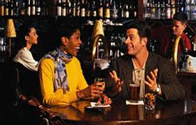题目内容
Japan is made up of a chain of islands that lie off the coast of Asia. People came to live in Japan from the nearby countries of China and Korea. From these older countries, the Japanese borrowed ideas, inventions and habits.
For many years, the Japanese built houses like those in China. They dressed themselves like a Chinese. From China came their way of writing and their habit of drinking tea.
In more recent times, the Japanese have borrowed things from our country, the United States. They have a government like ours. They do much work in science, as we do. Baseball is a favorite sport in Japan, just as it is here.
Things change when they come to Japan. The Japanese improve on almost everything they borrow. The art of garden making came from Korea and China, but the Japanese gardens are special. Each garden has a waterfall, a pond, and small bridges. There are few flowers in Japanese gardens. But the gardens are green during all the year round because they have many evergreens. Japanese gardens have a different kind of beauty.
小题1: The first paragraph of the passage tells us that ________ centuries ago.
小题2: In the third paragraph of the passage the italic (斜体)words “just as it is here” mean”________”
小题3: Why did the Japanese change the things they had borrowed?
小题4: From the passage we can see that ________.
小题5: Choose a statement from the following sentences that is NOT true.
For many years, the Japanese built houses like those in China. They dressed themselves like a Chinese. From China came their way of writing and their habit of drinking tea.
In more recent times, the Japanese have borrowed things from our country, the United States. They have a government like ours. They do much work in science, as we do. Baseball is a favorite sport in Japan, just as it is here.
Things change when they come to Japan. The Japanese improve on almost everything they borrow. The art of garden making came from Korea and China, but the Japanese gardens are special. Each garden has a waterfall, a pond, and small bridges. There are few flowers in Japanese gardens. But the gardens are green during all the year round because they have many evergreens. Japanese gardens have a different kind of beauty.
小题1: The first paragraph of the passage tells us that ________ centuries ago.
| A.the Japanese borrowed ideas only from China and Korea |
| B.people came to live in Japan from neighbouring Asian countries |
| C.Japan is much older than Korea |
| D.many Japanese came from the United States |
| A.just as it is in the United States |
| B.just as it is in China |
| C.just as it is in Japan |
| D.just as it is in Asia |
| A.They wanted very much to be different from others. |
| B.They didn’t like them the way they were. |
| C.They wanted visitors to like the change. |
| D.They tried to make them better. |
| A.Japanese gardens are different from those in other countries but not very beautiful |
| B.Japanese gardens are full of life during all the seasons |
| C.Japanese gardens are not very big |
| D.There are many flowers in Japanese gardens |
| A.The government of Japan is like that of the United States. |
| B.People in the United States like playing baseball. |
| C.The Japanese invented the habit of drinking tea. |
| D.Japan is made up of many islands. |
小题1:B
小题2:A
小题3:D
小题4:B
小题5:C
试题分析:日本是亚洲的岛国。古老的日本人就是从的附近的中国和韩国迁徙而来的。他们的很多习俗都源自中国或韩国。比如饮茶。在近代,日本开始学习和引进我们美国的东西。日本人几乎把他们借用的的一切事物都有所改善。林卡的造园艺术来自韩国和中国的,但日本的的花园是特殊的的。因为他们有很多的常青树。
小题1:理解归纳题,根据文中语句“People came to live in Japan from the nearby countries of China and Korea.”理解可知。日本人的祖先就是中国人和韩国人,故选B。
小题2:理解归纳题,根据文中语句“In more recent times, the Japanese have borrowed things from our country, the United States. They have a government like ours. They do much work in science, as we do. Baseball is a favorite sport in Japan, just as it is here.”理解可知。日本人和美国人一样喜欢棒球,故选A。
小题3:理解归纳题,根据文中语句理解可知,日本人把借用的东西继续改造,目的就是要把原来的东西变得更好,故选D。
小题4:细节理解题,根据文中语句“But the gardens are green during all the year round because they have many evergreens. Japanese gardens have a different kind of beauty.”理解可知。日本人的花园四季如春,故选B。
小题5:细节理解题,根据文中语句“From China came their way of writing and their habit of drinking tea.”理解可知。日本人的饮茶习惯是从中国传入的,不是他们土生土长的东西,故选C。
点评:阅读中注意短文后面的问题.然后带着问题再读短文,找出与答题内容相关语句,反复阅读,反复分析,然后确定答案.阅读中要善于从短文信息中总结推测出所需答案,注意所填答案与短文中相关语句的关系,与相关单词短语的关系.

练习册系列答案
相关题目
